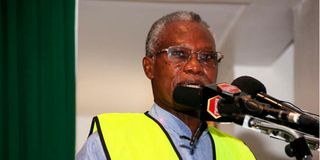Bar hate-mongers from vying in August elections

National Cohesion and Integration Commission (NCIC) Chairman Rev. Dr. Samuel Kobia delivers a speech at Kenya Institute of Curriculum Development (KICD), Nairobi on December 6, 2021.
The Reverend Samuel Kobia is a respected elder who rescued many souls from burning in eternal hellfire during his long service in the Methodist church.
He no doubt means well for Kenya in his current role as the country’s top anti-hate watchdog. Public expectations on him and the National Cohesion and Integration Commission (NCIC), which he chairs, are set to grow during the next seven months of this election year.
The magnitude of the challenge is underscored by the fact that the NCIC is already investigating two senators and an MP over alleged hate speech at political rallies in the first month of this year alone.
Whether those investigations will lead to prosecutions or convictions is another question altogether.
The NCIC has yet to secure a single conviction in high-profile cases since its establishment in 2008. It has tended to massage politicians’ egos through its so-called conciliation or give them a slap on the wrist.
I watched an old video clip of a politician speaking shortly after walking out of an NCIC questioning room and didn’t form the impression that the fellow was remorseful for the inflammatory utterances he had been accused of making at all.
It is noteworthy that the NCIC’s most publicised conviction remains that of a soft-target university student jailed for insulting President Uhuru Kenyatta on social media.
A politician’s playground
Yet it is not entirely the commission’s fault that political hate speech is still so common. Kenya remains very much a politicians’ playground, where they can do what they want, whenever they want.
An entrenched morally bankrupt political culture glorifies violence, perpetrated in the name of a community. In some places, a candidate who preaches ethnic hate is more likely to be elected than his or her rival who promotes peaceful co-existence. In a nutshell, hate pays for Kenya’s shameless politicians.
Last year, the NCIC lobbied Parliament to give it more independence, fearing some politicians were scheming to have it disbanded. The criminal justice system isn’t helpful either. The commission’s powers are currently limited to recommending hate-mongers for prosecution, meaning it is very much helpless once a case leaves its hands.
It is an open secret that cash-flush politicians have no problems hiring lawyers to secure lenient bail terms, delayed hearings or quick acquittals.
Some recent cases have proved that there can be public life after conviction. Sirisia MP John Waluke, who was jailed in June 2020 for multimillion-shilling fraud at the country’s food reserves, has been out on the campaign trail with Deputy President William Ruto, having secured his release on cash bail after only three months in prison.
For now, the NCIC’s best chance at curbing hate speech appears to lie in pushing the electoral agency to disqualify hate-mongers from vying for seats in the August 9 elections.
[email protected]. @otienootieno





